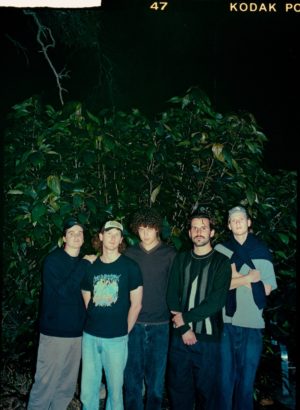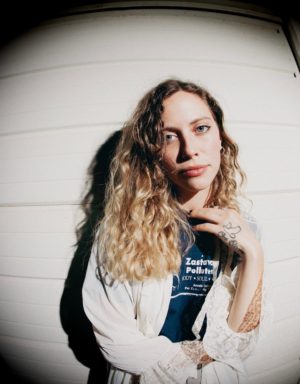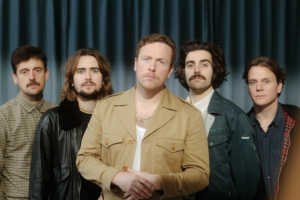Interview by Izel Villarba, find more of his work here. Photos by Lauren Khalfayan, find more of her work here.
After making waves in Europe, Fontaines D.C. are taking their first crack at America; first in New York, then SXSW, followed by an American tour opening for Idles. The only other time the Dublin outfit had been here was for a KEXP live session in Seattle, but last month they played to an American crowd for the very first time in their young, but burgeoning musical career. Of course the only American city any rock band can test their skills in has to be New York and the only venue they can really make a splash in has to be Union Pool. It just made sense.
I had the opportunity to sit down and chat with Fontaines frontman, Grian Chatten. Upon researching for this conversation I learned Grian was supposed to have a sort of cool, mysterious, “don’t give a fuck” demeanor and noticed in videos of performances that he would anxiously pace back and forth on stage between powerful deliveries of his lyrics. I wondered about these things going in and realized during our talk how much they all made sense. That “don’t give a fuck” attitude is not so much a part of some rebellious image as it is a reflection of a deeply inquisitive soul. Grian thinks a lot. He thinks a lot about a lot of things, and when you’re talking to him you see his thought process in the way he articulates his words and writes songs. Everything he puts out into the world is thoroughly honest and from the heart. We got to talking about what makes the Fontaines tick, Seattle rain, Irish poetry, and love.
If you had to pick between Yeats, Joyce, or Beckett?
Oh man, I’d have to say Yeats. Sometimes when I think about Yeats I well up in tears. I have such a profound connection with him. I think Yeats is a lot more “heart on the sleeve”, he’s a bleeding heart.
He puts it all out there.
Joyce would be more intellectually orientated, for most of his writings. But at the same time when Joyce chooses to reveal his heart it’s such a profoundly powerful, impactful experience. Because he knows his heart so well, he’s doesn’t need to tell you about it, he doesn’t need to share it with you. I’ve read Joyce’s poetry and it just doesn’t stand up to Yeats at all for me. But Joyce’s brain is as powerful as Yeats’ heart.
You guys bonded over poetry. Aside from what you bond over what do you and your bandmates disagree about?
There’s always the nitpicking, but we’re all so well versed in one another’s idiosyncrasies that it comes as no surprise when somebody annoys you. It comes in no new form ever. It’s just like family, everything they say has potential to annoy you but it’s up to you to take it like that.
Did it rain when you guys were in Seattle for KEXP? That was in the summer right?
Yeah it was summer. It was beautiful, I remember the coffee there. The coffee on the tap. The coffee that comes out of a big keg, like black beer.
Yeah, nine months out of the year it’s drizzling there, I could imagine Ireland is very similar.
Ireland is like that. The tap is always half on.
What’s Dublin in the rain like?
When it rains in Dublin it kind of reveals Dublin the way it is. Underneath all the sunshine that it tends to have, when it rains it’s its true form. It doesn’t jar the way it looks at all, it just fits it. The rain swiveling and careening through the cobblestones on any street that’s slightly steeped, it’s beautiful.
In New York when it rains and you see puddles, you see the gasoline and iridescent colors. It’s beautiful in its own way but when you think about it, it’s disgusting.
All you have to do is tell yourself they look like clouds. Like mad oily, contaminated clouds.
Stories play a big role in your songwriting. Do you guys ever start with the music first and then build a story off that or is it the other way around?
Yeah we do, whatever comes first just as long as it has a kind of pointed feeling that we all chase down. Whoever hasn’t written anything for it yet has to find something that suits that feeling or has to dig or sympathize with that feeling.
Does it stem from personal experiences as well?
Yeah to an extent. A lot of the lyrics are about stories I identify with but aren’t necessarily personal.
“Dogrel” is pub poetry right?
Yeah basically, it’s a working class poetry.
What kind of narratives do the Irish working class talk about? Like what kind of stories do you connect with in pub poetry?
When people talk in pubs there’s this terrific sense of knowledge. People tend to think they know everything, obviously when they’ve had a few pints in them. Recently I was in a pub with my da in my hometown and a fella came up to us outside the bar, outside the jacks (Irish slang for “toilet”) and he just turned around to us and he said “Hey fellas do you need any advice? Because I happen to know fucking everything” and then he looks at us as he says “and I might not remember it in the morning.” That’s exactly it. It’s that sort of pseudo-knowledge. I like when people expand on society and pretend that they know everything about society as well because people’s opinions become so absolute after a few pints and I like engaging in that.
I guess the opposite of Dogrel would be high class poetry. If you guys are making Dogrel music is there an example of high class music?
Well I think almost all music comes from a working class background and then it gets commandeered by the upper classes. It becomes a lot less interesting. It becomes contrived and superficial. If you look at hip hop for example, when hip hop came out it was obviously such a working class kind of thing, like NWA and all that kind of stuff.
Now it’s commercialized.
Yeah, and it’s literally about money.
You tell all these stories about eccentric Irish characters and people you meet in pubs. Would you ever want people to tell your story like that, in the same way you’re telling theirs? Do you ever think about the impact you guys are going to leave?
I’m typically a quite reserved, shy person. I don’t really like to get in the spotlight too often which is obviously contradictory to what I do. I usually come off stage and hide for a while. I don’t like to talk to people after gigs, so I don’t really have a desire to remain on people’s tongues after this stuff happens but I would like to leave a mark in the sense of inspiring people to get into literature and poetry because I think it’s very good for you. I don’t necessarily mind being talked about.
Is there someone specific you want to prove anything to?
I’m sure there is. I’m sure I want to prove something to my mom and my da. I’m sure I want to prove something to the people that inspire me who are often dead. Like if Shane MacGowan told me that he liked one of my tunes I think I could just retire. Cait O’Riordan from the Pogues is coming tonight. The fact that she’s coming now I’m kind of like, “what’s the point in playing the gig? I’m done!”
I read that one thing that really brought you guys together was a mutual love of the Beat generation and you named yourselves after the Godfather character, Johnny Fontane. These are very American things, very much relics of American culture. You’re about to go on a US tour and to SXSW, what are you going to tell America about itself? With the Irish twist that you have, what do you think you’re going to reveal to America that it doesn’t already know about itself, as outsiders and non-Americans?
Well I think anyone living on the outside of a group of people can tell that group of people something about themselves. Like I don’t think I know myself as well as my friends. I’m not really confronted with my actions as much as they are. I live in my own head and have a distorted idea of myself, which is the ego. I think societies and communities have the same distorted idea because they are committing the actions so they in that sense have an ego, innately. So I think it’s very easy as an outsider to come in and point things out to people, but also I think if you take an element of one society or one culture and you put it in the pool with another one, both societies become nuanced against each other, like differences, and they become more intensely aware of what they are. It’s like if you have a sibling and one of the siblings is into art and the other sibling is into business, I think being in such close proximity with such differences, you become more aware of your differences, so in that sense you’re inadvertently teaching each other things about yourselves.
An example I was thinking of was how the Rolling Stones brought the blues and a lot of music rooted in black culture, American culture, back to America when the whole British Invasion happened. A lot of black communities and much of the American population had forgotten about those types of music until the Stones and other bands brought them back in and it became mainstream; commercialized to a larger extent.
We’re all on the same planet. We’re all experiencing the same “flux”. With all the things going on in the world right now, no one is very absolute in what they think and there’s so much disarray and cognitive dissonance happening in everyone, so I think all that happens now really when cultures are crossed is people are basically looking at each other and saying “how are you dealing with all of this?” We’re basically having a conversation on how to deal with what’s going on.
What about American culture stands out to you?
I think that the way people talk to each other here is vastly different than the way they talk to each other in Ireland, like people are a lot more content to be rude in a healthy way I think so far.
People are more polite in Ireland?
Out of fear. Out of the fear of God people are more polite.
Is there any American crossover in Ireland? Like is there American-Irish food? Irish hip-hop? I’m curious as to what that would even sound like.
There is Irish hip-hop. There’s nothing about it that is exclusively Irish, apart from the accents and the vocal delivery or the stories that they tell. Kojaque is really good. There’s Versatile, and they’re hilarious and really good as well. They’re both from Dublin and they’re both very talented musicians. But there’s nothing borrowed from traditional Irish music within those groups.
What does it mean for music to have a Dublin accent?
It allows me to express myself fully. See I’m actually half British. My mom’s British and I was born in England and I moved over [to Ireland] when I was like two months old, and my dad’s Irish so it’s like I’m made up of two halves. I’ve spent my whole life trying to reconcile those two parts of myself and I think that’s the reason that I became so fascinated in Irish culture really because I was trying to prove to myself and prove to other people that I was as Irish, if not more Irish, than other people because it’d make me feel more at home. So I think that’s where the Dublin accent really came from; a desire to fit in. Funnily enough I’m one of the only people that actually sings in an Irish accent from Ireland there. That’s a classic example of coming over to a different culture and telling that culture something about themselves I think as well.
Would you consider Dublin your first love?
Yeah man. Dublin is like a third parent to me.
Third parent, first love.
Yeah exactly, it’s just got that beautiful sort of pain because when you love something you’re basically giving it license to hurt you, and Dublin definitely has license to hurt me.
Is Dublin where your first love was?
That’s a good question. Yeah. I feel like the first time I fell in love was with a girl from a different country. I’m not going to name the country, but I think that’s interesting because I definitely fell in love with the whole concept of that country and the difference of culture.
Does romance get lost in inauthenticity?
Absolutely. I think everything gets lost in inauthenticity. I think messages of artists often get lost in inauthenticity. If a band has a good message on paper but is too fashionable, too concerned with fashion, it’s just very difficult for me to listen to them because I can’t take them seriously.
It’s not honest.
Yeah exactly. I don’t believe them.
What makes something romantic for you?
I think it’s a need to be romanticized.
Do you feel the need to be romanticized? You, the band, the music, this whole thing?
Yeah I think I do. I think I need to romanticize everything that’s around me in order to feel like I’m living a fruitful life ya know; and a gorgeous life, something that’s profound.
That’s worth living for.
Something that I can lie down beside all the books and poems I’ve read and all that kind of world, because that’s the world I want to live in. I want to live in the world of the heart. Anything I say now can be romanticized, but I don’t want to live in an unromantic world.
Sounds boring.
Exactly.
So after the US tour and spending so much time away from home, do you expect to return as changed men?
I think I’ll be a changed man in a few ways. I’m very paranoid about staying the same. I make a point of visiting friends and family that won’t necessarily be as kind to me, the people that will bring me back down to Earth, when I’m home because I’m also paranoid of changing and getting too big headed. But it depends on how much culture we’ll see on the road because if we don’t see too much culture then we just come back often frustrated and overworked. The more culture we see, the more books we read, and the more views that we get to see will help us. I’m not really sure, I’m still quite new to this ya know.
Does Dublin feel like an ex-lover that you broke up with to see the world? Or is it more like a spouse that you’re looking forward to return home to?
It feels more like an ex-lover at this point, but I think that’s because we’ve consumed it, processed it, and then put it back out into the world creatively because we’ve written all these songs, we’ve made this album, the album is finished. I feel in a sense that there’s a little bit of a wrapping up of something after that happening, between us and Dublin. So if we got back, there’s an elephant in the room because we both know something’s not right. I don’t know exactly what that is; it’s an abstract thing, but it’s like something’s over ya know.
Are you optimistic about Dublin’s future?
I am. The youth of Dublin and the youth of Ireland are politically activated now because of the Repeal the Eighth Movement, which allows women to get abortions. It’s still not part of the law, it’s only been written into the constitution so there’s still a process, but I think that engaged everyone, all the youth in Ireland politically. [Ireland] is very much in the hands of its youth now.
How much of Ireland is still out of tune?
It’s a war between the good intentions of the youth and the growth of materialism and social media, technology, stuff like that because that’s just spindling the culture away in front of our eyes. But there is a furnace there still burning.
What do you think Ireland should be focusing on?
I think the people of Ireland need to look back into the past of Ireland with not reverence, but more understanding and more awareness and not reject it as something that belongs to an old and out of fashion generation because I think in the past lies the answer to the future for Ireland. I think if we all got caught up on what the future is without looking at the past, then we’re going down a very, very dark road.
‘Dogrel’ is out April 12th via Partisan Records — pre-order the album here. You can follow Fontaine’s D.C. on Facebook, Twitter, and Instagram















